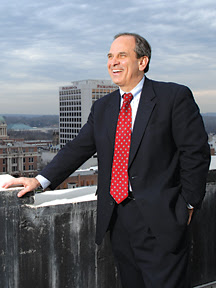Macon, GA.
The Macon Story of Shalom represents the first time in the history of Communities of Shalom that a local mayor initiated, hosted and facilitated ShalomZone Training in a city.
According to The Telegraph, a local paper in Macon, GA, Mayor Robert Reichert in 2009 called together more than 100 community leaders, pastors and residents and prodded them to organize small groups and begin revitalizing their neighborhoods block by block. Reichert’s idea is for residents to determine their neighborhoods’ needs — social, economic or housing related — and develop a plan to address them through Shalom Zones. Macon’s local TV station, FOX24, covered the event and aired a report on their nightly news.
The Macon Story of Shalom represents the first time in the history of Communities of Shalom that a local mayor initiated, hosted and facilitated ShalomZone Training in a city.
According to The Telegraph, a local paper in Macon, GA, Mayor Robert Reichert in 2009 called together more than 100 community leaders, pastors and residents and prodded them to organize small groups and begin revitalizing their neighborhoods block by block. Reichert’s idea is for residents to determine their neighborhoods’ needs — social, economic or housing related — and develop a plan to address them through Shalom Zones. Macon’s local TV station, FOX24, covered the event and aired a report on their nightly news.
Mayor Reichert was introduced to the Shalom concept by United Methodist leaders in South Carolina. When Bishop James King, Jr., and Dr. Brad Brady, Macon District Superintendent, heard the Mayor’s vision for ‘creating safe zones in the city’ to reduce crime, rid neighborhoods of drugs, rebuild dilapidated houses and improve community life, they informed him about the Communities of Shalom initiative of the United Methodist Church.
Impressed by the similarity of vision and approach, the Mayor and his staff researched the movement and contacted the National University. National Director Michael Christensen and Program Associate and Trainer Annie Allen were invited to come to Macon for a day to present the Shalom model of asset-based community development. Over 100 leaders from the city, representing UMC, AME, CME, Missionary Baptist and Pentecostal churches, sat around tables with heads of city agencies, council members, Jewish rabbis, NAACP leaders, and police officers, to hear and discuss Shalom. The Mayor shared his vision and introduced two resources: a Federal grant program for community development and ShalomZone training. After Dr. Christensen and Minister Allen presented the Shalom model and introduced training content in a workshop format, there was enthusiastic discussion as those
gathered responded positively to the idea of Macon becoming a ‘City of Shalom’ and organizing
four shalom teams to prepare for future training.
As Mayor Reichert explained to local reporter, “I’m hoping to inspire groups of people to come together and organize in their neighborhood, to lay claim to a defined area within their neighborhood and through partnering with the city to bring resources into the area”.
Communities of Shalom National Site Coordinator Annie Allen says Macon has all of the necessary ingredients for the concept to be a success. “This is a wonderful opportunity. There’s lots of wide range of people here today. A great group of people who, I think, which just a little bit of alignment can make a huge difference in Macon.”
Dr. Christensen stated, “Usually, a local United Methodist Church, a District or an Annual Conference initiates Shalom in their area. This is the first time that I know of that a Mayor of a city heard about Shalom and initiated the application process. At least five zones in the city of 200,000 have been identified – there is incredible momentum here."
Here's a short Shalom clip by video-journalist Ted Johnsen of Drew University, posted this week on the City of Macon website: http://www.cityofmacon.net/node/12394
Here are two TV news clip on the Shalom story in the city of Macon:
